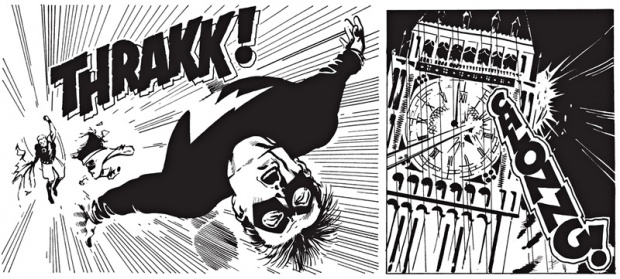 Greetings, Whatnauts! We hope Episode 171 finds you well, since it found us on the edge of wellness (look for the DVD marketing of Edge of Wellness to confuse everybody into thinking it’s actually called “Cough, Mute, Repeat”). Despite our professed love of the partially muted cough or sneeze, Jeff put a lot of work into editing that out so all you get are two hours and seven minutes of pure, unfiltered comic book opinionation! Look at the show notes below and see!
Greetings, Whatnauts! We hope Episode 171 finds you well, since it found us on the edge of wellness (look for the DVD marketing of Edge of Wellness to confuse everybody into thinking it’s actually called “Cough, Mute, Repeat”). Despite our professed love of the partially muted cough or sneeze, Jeff put a lot of work into editing that out so all you get are two hours and seven minutes of pure, unfiltered comic book opinionation! Look at the show notes below and see!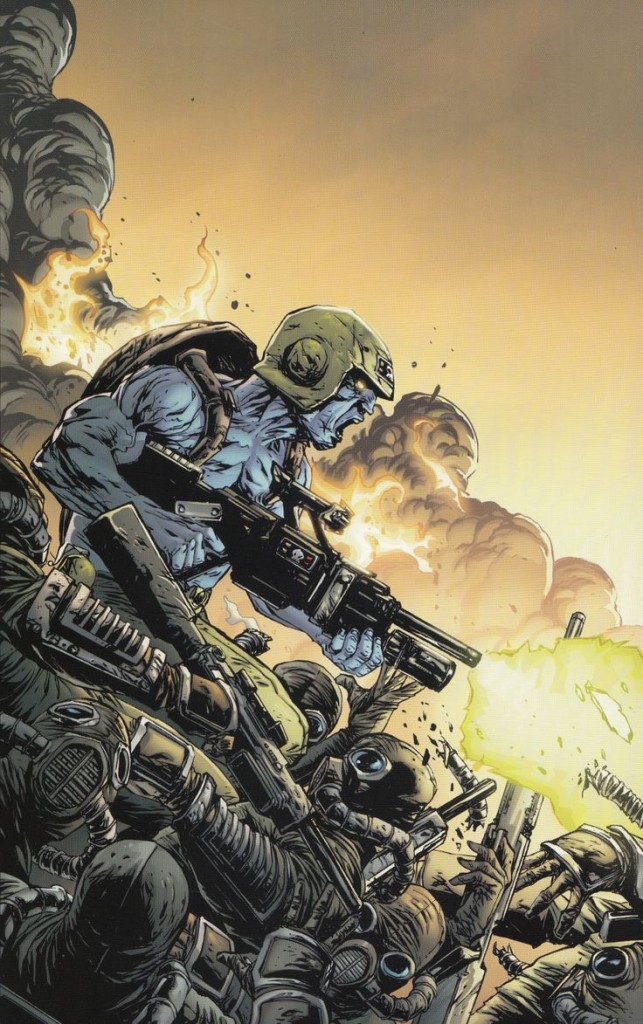 00:00-10:29: Bonus musical opening! And then we *finally* announce the winners of our Rogue Trooper Last Man Standing contest, where the contestants told us what they would rename us if we were biochips and what piece of equipment you put us on. Listen in as we announce the winners and read their entries because they are, as Graeme so perfectly puts it, “harsh but fair but harsh.” Congratulations to Eric Reehl, Brendan O’Hare, Michael Loughlin, and Matthew Murray, and big thanks to Last Man Standing author and Whatnaut Brian Ruckley for making it possible for us to share the love (no matter how belatedly).
00:00-10:29: Bonus musical opening! And then we *finally* announce the winners of our Rogue Trooper Last Man Standing contest, where the contestants told us what they would rename us if we were biochips and what piece of equipment you put us on. Listen in as we announce the winners and read their entries because they are, as Graeme so perfectly puts it, “harsh but fair but harsh.” Congratulations to Eric Reehl, Brendan O’Hare, Michael Loughlin, and Matthew Murray, and big thanks to Last Man Standing author and Whatnaut Brian Ruckley for making it possible for us to share the love (no matter how belatedly).
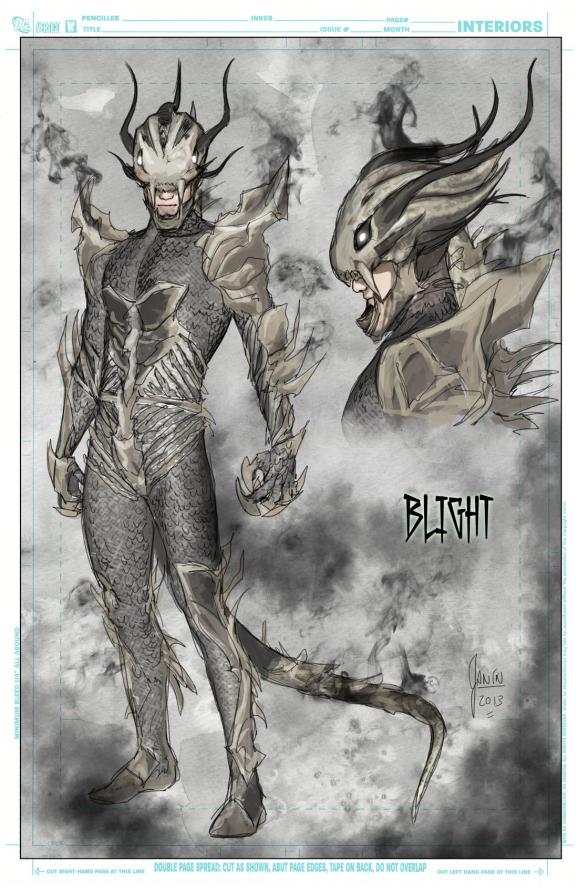 10:29-36:13: Graeme has been catching up on a bunch of old comics recently and one of them is the collected edition of DC’s Forever Evil spinoffs, and tells us about Forever Evil: Blight, a sixteen issue sub-event that starts out great and then burned through so much of Graeme’s good will, it’s kind of a shame. Also discussed: Alan Moore and American Gothic and John Constantine (and Bob and Carol and Ted and Alice); J.M. DeMatteis; DeMatteis’ run on Defenders and Captain America; Ray Fawkes; shout outs to Jesus; Jamie Delano’s Hellblazer run; Gary Seven; the Star Trek: Vanguard
10:29-36:13: Graeme has been catching up on a bunch of old comics recently and one of them is the collected edition of DC’s Forever Evil spinoffs, and tells us about Forever Evil: Blight, a sixteen issue sub-event that starts out great and then burned through so much of Graeme’s good will, it’s kind of a shame. Also discussed: Alan Moore and American Gothic and John Constantine (and Bob and Carol and Ted and Alice); J.M. DeMatteis; DeMatteis’ run on Defenders and Captain America; Ray Fawkes; shout outs to Jesus; Jamie Delano’s Hellblazer run; Gary Seven; the Star Trek: Vanguard series; and the phrase “come through my magical portal!” which Graeme says with such panache it really does deserve to become its own meme.
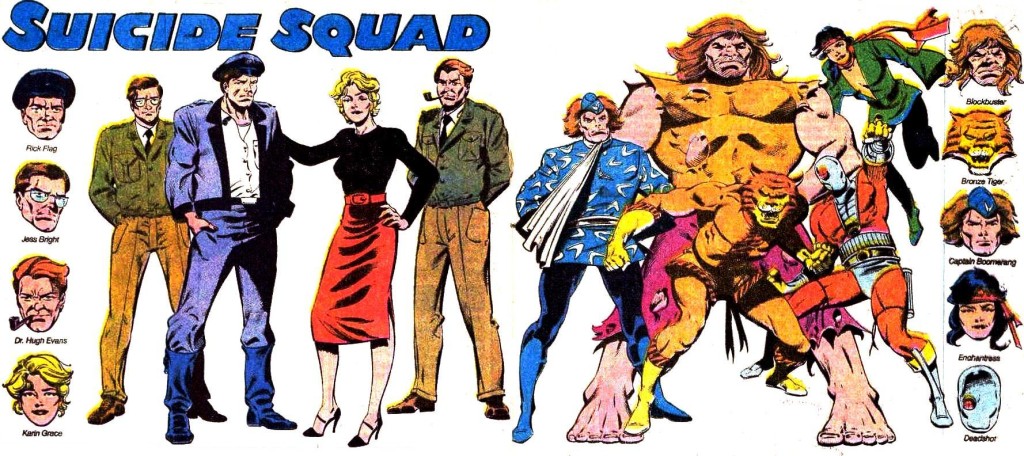 36:13-46:33: Also read by Graeme: five or so collections of New 52’s Suicide Squad, with runs by Adam Glass, Ales Kot, and Matt Kindt on writing. Also discussed: the Ostrander Suicide Squad run; Charles Soule’s Thunderbolts; Thunderbolts as being overdue for a big Marvel Unlimited readthrough on Jeff’s part; Warren Ellis as muse of Marvel Comics; and an appearance by everyone’s favorite set of barking dogs, Ernie and Gus!
36:13-46:33: Also read by Graeme: five or so collections of New 52’s Suicide Squad, with runs by Adam Glass, Ales Kot, and Matt Kindt on writing. Also discussed: the Ostrander Suicide Squad run; Charles Soule’s Thunderbolts; Thunderbolts as being overdue for a big Marvel Unlimited readthrough on Jeff’s part; Warren Ellis as muse of Marvel Comics; and an appearance by everyone’s favorite set of barking dogs, Ernie and Gus!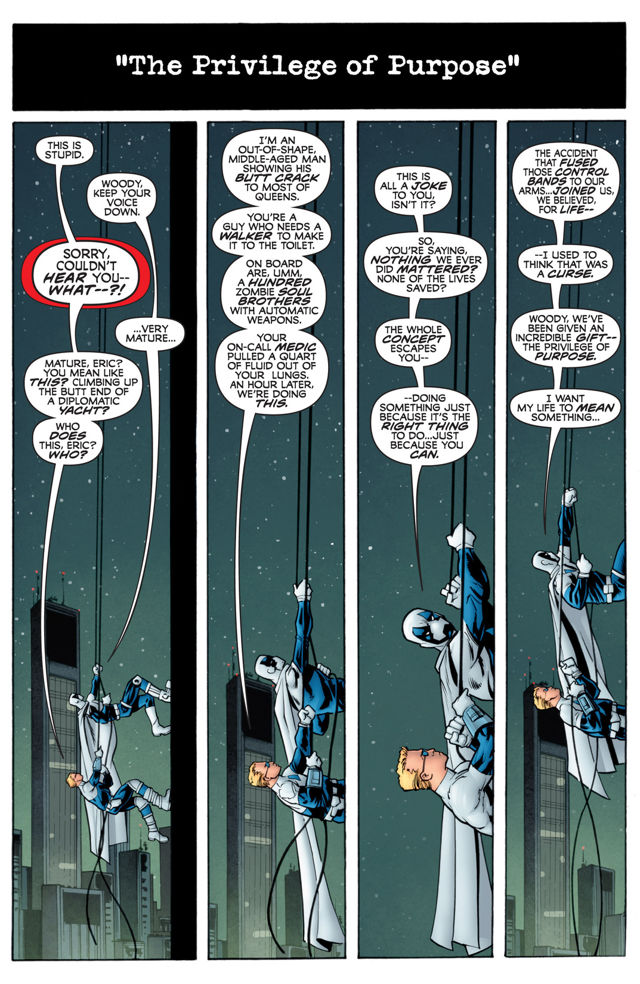 1:23:28-1:27:31: “We’ve gone horribly off-topic; how did we even get onto this?” Unsure, we turn to another set of comics Graeme tackled this week: Valiant, which Graeme especially enjoys when tackling in big chunks, as he did with Rai and Q2: The Return of Quantum and Woody, as well as new titles like Imperium and Ivar, Time Walker.
1:23:28-1:27:31: “We’ve gone horribly off-topic; how did we even get onto this?” Unsure, we turn to another set of comics Graeme tackled this week: Valiant, which Graeme especially enjoys when tackling in big chunks, as he did with Rai and Q2: The Return of Quantum and Woody, as well as new titles like Imperium and Ivar, Time Walker.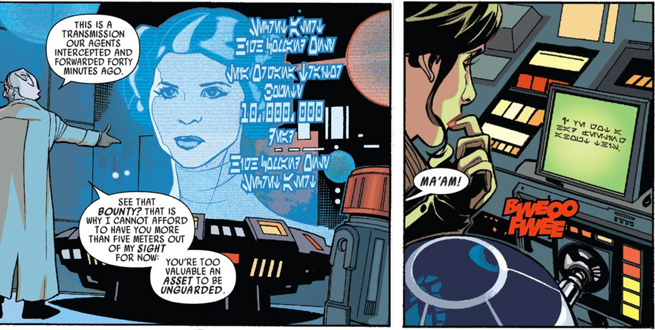 1:46:52-1:51:55: Jeff bought and read Princess Leia #1 by Mark Waid and Terry and Rachel Dodson and has a lot of ambivalent feelings about it (and Star Wars in general). Listen here to find out why! (Ha, and I said Graeme was pushy.)
1:46:52-1:51:55: Jeff bought and read Princess Leia #1 by Mark Waid and Terry and Rachel Dodson and has a lot of ambivalent feelings about it (and Star Wars in general). Listen here to find out why! (Ha, and I said Graeme was pushy.)Remember, if you do not like our audio player (and many of you do not), and you don’t like retrieving our podcast from the RSS feed or what have you, check out the very first comment for a plain text link for you to copy and paste freely! As mentioned above, we will be back next week with Episode 3 of Baxter Building. So if you excuse me, I have some crazy-ass Kirby/Lee comics to attend to…but, as always, thank you for listening!


Firsties! Linksies (though in more of a cut & paste kind of way):
http://theworkingdraft.com/media/podcasts/WaitWhat171.mp3
Thanks for naming me a contest winner, guys!
About Boy the Cot… it really was me thinking of a joke and running with it. I almost sent an apology with it, but didn’t. I’ve listened to and enjoyed Wait What since day 1, and all ribbing was meant in good fun. I apologize for any negativity my inadvertent passive-aggressiveness may have caused.
Anyway, I just finished FF 25-36 & Annual 2, and look forward to hearing your thoughts. Waaaay better than 14-24, I thought.
So many thoughts I need to write down while I still remember them: it’s getting to the point that I need to start making notes! Thoughts, in no particular order:
1) Thanks for introducing me to Rachel and Miles X-Plain The X-Men: they’re currently going through a period that I very much feel of as “my” X-Men (basically Uncanny’s 150 to when Romita Jr left) so I’ve caught them at the right time. But don’t worry, you two are sill my favourite married couple in comics, and I desperately want someone to draw the two of you in the Uncanny #137 cover poses. Or maybe just a team up episode?
2) I really wanted to enter the Rogue Trooper competition, but could only come up for an idea for Jeff, so thought it best not to. In my head cannon, Jeff is, of course, The Beard. But he is the prototype Bio Chip and therefore a Macro Chip that takes up the entirety of northern America and looks like a giant electronic beard as drawn by Jack Kirby, complete with Kirby Krackles as it releases its pent up energy. Because of his size, The Beard speaks slowly but sagely, with the northern hemisphere of the world reverberating to his exclamations of “HMMMMMMMMMM…. INTERESTING.”
3) I’m always fascinated by the reception of Captain America: Winter Soldier because for all I liked it, I agree with you regarding it’s flaws: America,as represented by SHIELD, is corrupted by outside forces, and the solution is to take away as much power as a possible from the Government. In short, a Libertarian’s dream. for me the far more subversive film is Iron Man 3, where the US government is seen to be dominated by the Military Industrial complex, and the hero at the end of the film decides the answer to things is to personally destroy his Weapons of Mass Destruction, as much as a statement as to make sure nobody else can use them.
It’s a shame it’s a character arc that will be ruined by Avengers: Age of Ultron, where he will be seen to build yet ore Weapons of Mass destruction.
4) It’s interesting regarding Graeme’s thoughts towards the characterisation of John Constantine when he was originally introduced. I was a reader at the time (I can genuinely blame Alan Moore ad Swamp Thing for getting me whole heartedly into DC Comics back in the 80’s) and remember the mystery of the character was much discussed on the letters pages. IIRC, he was primarily introduced because Steve Bissette liked to draw background cameos of Sting, and Moore wanting to introduce a character as a narrative device to guide the Swamp Thing through the American Gothic storyline. In a moment of creative desperation or genius (delete where applicable) Moore decided to build a character around the one Sting played in Dennis Potter’s movie Brimstone and Treacle. Which actually makes sense of the moral dubiousness explored by later writers.
Amusingly that little prankster Grant Morrison pulls off a post modern joke at Moore’s expense in Doom Patrol: Willoughby Kipling is a character that fulfils very much the same purpose, and is also based around a pre-existing movie character. It’s just that this time, the basis is Richard E Grant’s Withnail from Withnail & I…
And of course, any comics character based around Withnail will always be more interesting than Sting.
5) Again, from remembrances of reading it at the time, any thoughts of Zenith being overly based on concepts from Marvelman were forgotten by halfway through issue one. Poor Red Dragon.
6) The Blight? Ales Kot’s run on Suicide Squad? I genuinely thought when I read the show notes before listening that these were never actually published works and you were going to talk about “what may have been” scenarios, as I have no idea these even existed! Have things really come to this where there are vast swathes of modern comics that I simply no nothing about?
7) Sorry about the length, and one day I want someone to record a podcast that relistens to the Wait What podcast from the beginning in the style of the Baxter Building! You know it makes sense.
Wooo! you’re lookin’ at a winner! It’s an honor, to be sure.
Lot of good stuff to think about in this episode. The Ostrander, Yale, McDonnell Suicide Squad was just about perfect in my book. I’ve checked out every series since and I have to say the closest I got to that bronze age series was the New 52 run, once you get past the character redesigns and/or fat/woman/beard bashing. A lot of people truly hated Glass’s run, but most of the problems were from the New 52 in general in my opinion, and he had a couple fun story arcs before the book got hijacked by Death of the Family. My hopes were kinda dashed when Ales Kot was let go from the title after only 4 issues. He was definitely the peak, especially paired with art by Patrick Zircher, and even managed to right a lot of the series’ wrongs in-story without seeming desperate. I thought Kindt would be an apt replacement, but he didn’t go full Kindt, and the issue he did for Deadshot for villains month was pretty much the most one could possibly New 52-ify an origin story. So I followed Kot to Zero and gave up on the squad. It was a rocky ride, but overall I don’t regret much about reading it. Definitely one of the most balls to the wall, zany adventures from the relaunch.
Thanks for choosing me as one of the winners to the contest, though I’m sure the person who donated the books is just glad you finally awarded them : )
As for Baxter Building, I’m really enjoying reading along, though I’m not sure how many issues of old Fantastic Four comics I can read a month. So far 12 has been a pretty good number…
Technically, most of the giveaway books were provided by the good folks at IDW – but I’m sure those good folks are just as glad as I am that they’ve been successfully rehomed. Can’t think of a better place for them to end up than in the hands of the loyal, discerning and undoubtedly good-looking followers of Specs and Boy the Cot.
Thanks for another edible show. I agree, Alex Kot’s Suicide Squad was excellent, did we ever hear why he left the book so soon?
And am I wrong in assuming Graeme got the Specs nickname because he says ‘SPEC-tacular’ almost as much as ‘Here’s the thing’?
How about a Steve Gerber Defenders re-read?
I think that both of you guys are thinking about the Nick fury/S.H.I.E.L.D. thing wrong. First, it’s not about being brought down by forces from without. It’s about ideology. The United States, apart from some intervals of being primarily concerned with financial crises, have spent about 100 years having ideologies as our primary antagonistic forces. It’s gone foreign nationalism, to communism, then fascism, back to communism, and now Islamic religious extremism. The American protagonist narrative during the same period is about a single man, or a small community of people led by a man whose goodness they can believe in against a larger system. Men of conscience are good, systems that order things higher than people are bad. This makes a lot of sense in terms of antigovernment rhetoric, the general anti-bureaucratic bent, anticorporate sentiments, and the anti-command economy tendency, and explains a lot of weirdness in American politics including an insane level of faith in markets and a greater trust in small local level things, even though the former inevitably crushes the latter. S.H.I.E.L.D. is an offspring of the anti-Communist narrative, where “those guys” don’t believe in the freedom of the individual but of an ideological system that takes over people’s minds, so it was conceived of as a place where an individual agent (having agency) is the necessary thing to beat the other guy. But in the current narrative, S.H.I.E.L.D. would be part of the problem because it is a big bureaucracy and would squelch that individual freedom. It makes sense that it would become ideologically compromised. This is not really from without, this is a factor of what it is – an organization that because of its size and complexity reduces the human dimension, and is an excellent breeding ground for an ideological infection.
In other words in order to understand what is going on here, you should contemplate 24 like a koan. Jack Bauer is an individual trying to solve the problem, while the law enforcement apparatus is bureaucratized and stands in his way. Of course there are traitors there, the place is ideologically compromised by its structure and nature. They are in his way, thus they are wrong. Those around him either learn that he is right, and organize themselves around the small group led by the noble individual, or turn out to be evil. This is the thing that is going on with S.H.I.E.L.D. as far as Nick Fury is concerned, In the movies he is one of the noble people trying to rebuild. In the comics, Secret Invasion and the Bendis narrative fits this same model, while more recent developments are more complicated, essentially telling the story that that kind of man can’t really exist in the system anymore, you need a new kind of noble hero that can lead differently (Maria Hill, willful in a less individualistic way) in this technocratic situation (the people behind that move had a greater belief that good government is possible then the movie people think the general audience will buy). I think the stuff with the Watcher is the kind of botched metaphor that you are eventually going to get when you have so many people with ideas that are not fully formed (many of the writers are quite young) all trying to assemble the stuff both in parallel and in series. I think they wanted to say that Fury and the Watcher were similar in that they are two sides of the same coin, not adapted for the new reality – the head and the hand – the person who has to integrate all the information which is now too much and the person who has to do something about it who is now too compromised with impossible decisions. So I think fury killing the Watcher at his behest makes sense as a metaphorical form of suicide (the hand pulling the trigger and the head dying).
I have a much different opinion on the various Marvel crossovers than you do. This partially has to do with the fact that I think you need to judge crossovers on different merits or depending on what their strengths are. Besides Civil War, I actually think the most successful Marvel crossover is Secret Invasion, because it was clearly, across the board the most successful (again, other than Civil War) in one aspect that people tend to ignore: the level of fan engagement. The conceit that the enemy was among us, ripped from Battlestar Galactica as it was, really stimulated conversation, and the way that the two Avengers titles explored and revealed back story as fuel for the fire, Marvel came up with those leaks, and the series rolled into Dark Reign (the bad guy wins!) was executed perfectly to make people go crazy on the internet. I think that level of gamesmanship is never considered when people are talking about “how slow this spine story is” or “how essential the tie-ins are.” Secret Invasion really worked in that important way and you need to give it credit for that. Marvel managed to do a lot of good work on that level up until Fear Itself, at which point the wheels came off the bus (it is odd that that was the line of demarcation of the newer writers taking over the big crossovers, I don’t know if they have less instinct for stuff that is going to connect on the watercooler level).
Axis had its charm (I wrote a lot about it here: http://redantsunderneath.tumblr.com/post/108379553231/avengers-and-x-men-axis ) but was hamstrung by being so heavily tied to Remainder’s Uncanny Avengers which was kind of a slog. I think that generation of writers has been turning in a higher percentage of crap for Marvel since Image started opening books big – it seems like they are trying to bring big ideas to the creator owned books, but not decreasing the number of Marvel books they work on, and we get a lot of diluted work e.g. Remender, who managed to do a good job with similar work on Uncanny X-Force, falling flat on UA. Still, Axis has some unexpectedly fun stuff in it, even though it kind of doesn’t gel (the first third is really the end of the Uncanny Avengers story while the last two thirds is a different thing that is truly the spine of a crossover and not a cohesive unit).
But, I think you would agree, it’s time to let Ales Kot write a big crossover. He is uniquely suited and that would be something.
Oh, I can’t think of a time when Marvel Comics weren’t simultaneously against and for The Man. Even in its most “radical” phase in the early to mid 70s post Stan and Jack years there was only so far writers could go critiquing authority, and being under the Comics Code didn’t help. Bless them for trying, though–Marvel simulated youthful rebellion a lot better than DC did, at least to my young eyes. But it’s never been anything but skin deep.
I don’t think you can do anything but a shallow social critique with superheroes. Especially if you’re trying to do an Alan Moore-ian grand statement on the relationship between superpowered vigilantes and the State. The genre isn’t capable of supporting that kind of weight. You inevitably end up with the reductionist conclusion that superheroes are essentially fascist, and that’s problematic if you’re Moore or something kind of good if you’re Frank Miller. Marvel’s attempts at relevance in making its heroes an arm of the government post-9/11 were ham-fisted critiques of the Bush administration, but I suppose they did re-center the Marvel Universe in something sort of resembling real-world concerns after the horrible excesses of the 90s.
I didn’t find the revelation in the Winter Soldier movie terribly deep as a critique of government power, because HYDRA. (It’s actually using Godwin’s Law as a plot device!) Also, SHIELD’s status as a national vs. International organization is as muddled in the MCU as it is in the comics, and the movies’ reluctance to actually use the UN as an entity instantly renders everything in a cartoonier light. That nebulous international security council in Avengers and Winter Soldier reminded me more of The Guild of Calamitous Intent than it did the UN. But what did shock me was the promise of the MCU de-Ultimating the Avengers, basically undoing the comics’ status quo for the last 10 or so years. Whether they follow through with it is still up in the air, and bringing in the Civil War storyline doesn’t fill me with the confidence that the Avengers will remain an independent entity for long. Although, as Jeff and Graeme pointed out, a good chunk of Avengers history is the struggle against federal bureaucracy, so who knows?
I forgot to commend you on the episode subtitle, Blight Said Fred – does that mean anything to my US chums?
Just those “too sexy for my shirt” guys? It made me snicker when I thought of it, so glad someone else dug it.
And before that, a classic song from British national treasure Bernard Cribbins!
http://youtu.be/r5XX9LX2es4
The New 52 handling of Suicide Squad has been such a mess. I agree, as do most, that Ostrander’s run was amazing. I recently re-read the whole thing and caught some bits I had missed back in the 80s and it very much still holds up – one of the absolute best runs of a Marvel/DC title ever. Glass’s initial New 52 run, which I read in trade, was wildly inconsistent. The first issue was a total cluster—, but then there were a couple solid issues and some decent characterization and art before it devolved into crossovers and crappy plotting. I started picking up singles with Kot’s first issue, which was pretty genius, and his three following issues were good, if not up to the level of his debut. After that, I dropped it when Forever Evil hijacked the story. I tried the New Suicide Squad, but it was so awful I dropped it immediately.
Re: the Baxter Building progression question…I think you cats should take it at the pace that feels right to you. Your enthusiasm for the material is part of what makes the show so enjoyable, and I’m thrilled to be on that ride whether it takes 1 year or 1 BILLION years.